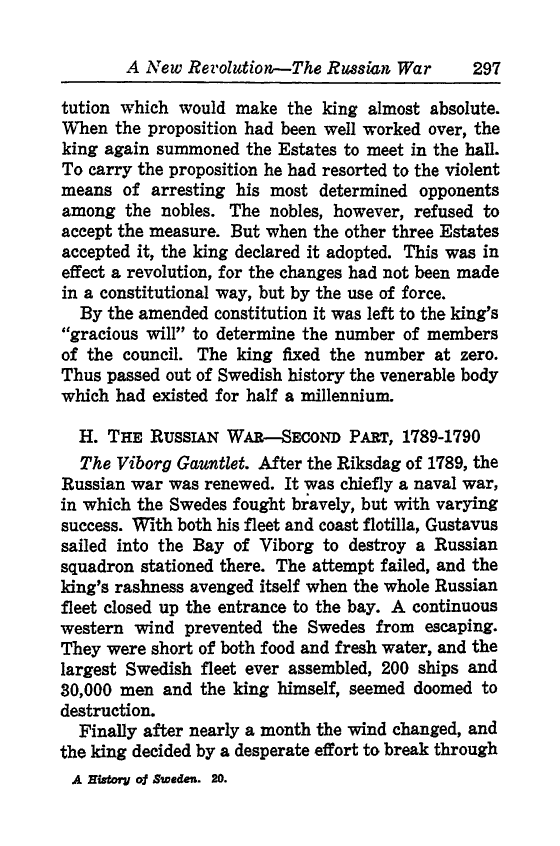
Full resolution (TIFF) - On this page / på denna sida - XVI. Reign of Gustavus III, 1771–1792 - G. The Riksdag of 1789. New Revolution - H. The Russian War—Second Part, 1789–1790

<< prev. page << föreg. sida << >> nästa sida >> next page >>
Below is the raw OCR text
from the above scanned image.
Do you see an error? Proofread the page now!
Här nedan syns maskintolkade texten från faksimilbilden ovan.
Ser du något fel? Korrekturläs sidan nu!
This page has never been proofread. / Denna sida har aldrig korrekturlästs.
A New Revolution The Russian War 297
tution which would make the king almost absolute.
When the proposition had been well worked over, the
king again summoned the Estates to meet in the hall.
To carry the proposition he had resorted to the violent
means of arresting his most determined opponents
among the nobles. The nobles, however, refused to
accept the measure. But when the other three Estates
accepted it, the king declared it adopted. This was in
effect a revolution, for the changes had not been made
in a constitutional way, but by the use of force.
By the amended constitution it was left to the king’s
"gracious will" to determine the number of members
of the council. The king fixed the number at zero.
Thus passed out of Swedish history the venerable body
which had existed for half a millennium.
H. THE RUSSIAN WAR SECOND PART, 1789-1790
The Viborg Gauntlet. After the Riksdag of 1789, the
Russian war was renewed. It was chiefly a naval war,
in which the Swedes fought bravely, but with varying
success. With both his fleet and coast flotilla, Gustavus
sailed into the Bay of Viborg to destroy a Russian
squadron stationed there. The attempt failed, and the
king’s rashness avenged itself when the whole Russian
fleet closed up the entrance to the bay. A continuous
western wind prevented the Swedes from escaping.
They were short of both food and fresh water, and the
largest Swedish fleet ever assembled, 200 ships and
30,000 men and the king himself, seemed doomed to
destruction.
Finally after nearly a month the wind changed, and
the king decided by a desperate effort to break through
A History vj Sweden. 20.
<< prev. page << föreg. sida << >> nästa sida >> next page >>